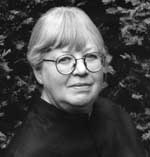Spectator: Leslie Geddes-Brown on surnames
The names still found in Yorkshire are evocative of past times, says Leslie Geddes-Brown


Exquisite houses, the beauty of Nature, and how to get the most from your life, straight to your inbox.
You are now subscribed
Your newsletter sign-up was successful
We used to live in Halifax. Our house, with stone roof tiles and blackened, mullioned windows, had above the main door a cartouche reading HM 1625, the date of the building and initials of its owner, Henry Murgatroyd. The name could not be more typical of the area: royd means a ‘ridding' or clearing in the woods and, the Oxford Dictionary of English Surnames says, Murgatroyd derives from Margaret's Ridding. Another Murgatroyd, John, built East Riddlesden Hall, now owned by the National Trust. Apparently, he was the model for Sir Despard Murgatroyd, the bad baronet in Gilbert and Sulli-van's Ruddigore. Betty Boothroyd, the former Speaker, takes her name from a shed in a clearing.
In fact, if you want an area of Britain where the surnames are still gritty and toothsome, you couldn't do better than West Yorkshire. The names of Alder-man Joseph Helliwell, Councillor Albert Parker and Mr Herbert Soppitt, from Bradford-born J. B. Priestley's play When We Are Married (1938), are not exaggerated, unlike Dickens's. The action takes place in Cleckle-wyke-a mix of Cleckheaton and Heckmondwike, known locally as Cleck and Heck.
In Ovenden Wood, where we lived, we knew a Clifford Horse-field, who was a professional dry-stone waller. Clifford, as a surname, is typical of Halifax. I was once rescued from a horse by a neighbour, Ellsworth Long-bottom. Longbottom is pure West Yorkshire and refers to a long valley, not a long rear. And, I suppose, Sidebottom means a wide, side valley. I knew a couple who bowdlerised it to ‘Siddey-bottome' missing the whole point of such a splendid name.
Up our valley, there was a potato merchant whose name, proudly lettered above his premises, was Uriah Jagger. Jagger comes from a Halifax word for a beggar, Mick notwithstanding. And let's add in the ancient family of Scargills, whose seat was at Thorpe Stapleton.
Another feature of West York-shire names is a fondness for biblical Christian names. Uriah was the husband of Bathsheba, who King David fancied and got pregnant. Uriah was sent to his death as a result, so why would a potato merchant call his son that? And what could be a more splendid name than Alderman Ira Ickringill, Mayor of Keighley, who founded a mill in Bradford in 1860 that became one of the biggest worsted spinners in the world, employing 2,000?
Nebajoth Denton was called after one of the wilderness tribes and Obadiah Nusse is a name for the servant of God. Or there's the Rev Jabez Tunnicliff (a Lancashire surname this time). Another owner of our Halifax house, Elkanah Waddington, was named after an Old Testament (OT) gent known for his polygamy.
Failing the Bible, in Yorkshire, you can go for Roman emperors, as in Sir Titus Salt, who built the World Heritage Site model village of Saltaire in Bradford in 1851; the surgeon Claudius Galen Wheel-house (another Yorkshire name); and Julius Caesar Ibbetson, the Leeds artist, named because he was born by caesarian.
Exquisite houses, the beauty of Nature, and how to get the most from your life, straight to your inbox.
What seems extraordinary is that, 600 years after surnames were first introduced, there are still plenty of families in West Yorkshire with names such as Waterhouse, Holdsworth, Ingram, Shuttleworth and Ramsden. We knew an Annie Hinchliffe (very particular that it wasn't spelt Hinchcliffe) and a Jerry Pickers-gill (meaning a robber's ravine). James Sugden (from a sparrow's valley) ran a cashmere mill and Alfred Wainwright, famous for his Lake District walks, has a typical West Yorkshire name.
Benjamin Septimus Brigg (for bridge) was the first Mayor of Keighley and Job Senior, the Rombalds Moor Hermit, has a surname typical of Yorkshire, meaning a peasant who gives himself airs. Job, of course, is another OT name. They're all to be found in Yorkshire, God's own county.
* Subscribe to Country Life; Country Life on Ipad
* Follow Country Life property on Twitter
Country Life is unlike any other magazine: the only glossy weekly on the newsstand and the only magazine that has been guest-edited by His Majesty The King not once, but twice. It is a celebration of modern rural life and all its diverse joys and pleasures — that was first published in Queen Victoria's Diamond Jubilee year. Our eclectic mixture of witty and informative content — from the most up-to-date property news and commentary and a coveted glimpse inside some of the UK's best houses and gardens, to gardening, the arts and interior design, written by experts in their field — still cannot be found in print or online, anywhere else.
